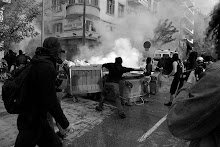Prison is a plague that society does everything to conceal with remarkable zeal, yet prisons still stand. It’s common to be moved to tears by some movie about prisoners at the cinema yet we manage to keep our eyes shut in the face of a prison imposing its shadow just a step ahead of us. No one talks about it, but we all respond to the iron hand of the law in some way as the safe circulation of commodities and profit for the bosses demands stricter and stricter rules and punishment. Things are getting harder, pushing many to some kind of delinquency. At the same time, not only does all deviant behaviour get criminalised but the whole of everyday life is being transformed into an open prison with its own regulations, guards and outrageous penalties, sterile and poor, where more boredom is the only thing to be expected. The modern State is a police State. Not only can we all end up in prison, in a way we are already there.
With the prison population growing steadily along with the profits for those involved in this prolific enterprise, more and more people will be subjected to even shorter chains. Tortured with every modern method, ensuring they and their own will suffer much more than the harm they might have caused. Just like most of us outside, they survive. Some go crazy. Some fight back. Sometimes they rebel.
In Greece, last year’s mutinies following the beating of the anarchist prisoner G. Dimitrakis lead to many days of riots, prisons set on fire, and the riot cops beating their way in through a suffocating fog of tear gas. The prisoners survived. They even got stronger. Learned to fight together. Outside the prisons anarchists and revolutionaries spread information, organized gatherings, prison demonstrations, direct action, sometimes even set police stations on fire. Prisons aren’t unknown to whoever engages in a fight against this rotten establishment.
After mass transfers, beatings, torture, the prisoners in Greece haven’t ceased to fight. On November 3, after they warned the authorities to take some measures to improve prison conditions, decrease detention years and put an end to prison guard violence, disciplinary charges, pre-trial imprisonment (1/3 of all prisoners are still awaiting trial) and juvenile prisons, the largest collective hunger strike was launched. By now, more than 2.000 out of 13.000 prisoners are on hunger strike, while several thousand more are boycotting prison meals, around all of the 21 prisons of the country. The Greek government and mass-media choose not to bother themselves with the prisoners, expecting them to get exhausted soon.
Not unlike prisons, this society of commodities is designed to isolate us, in order to render us fearful obedient tools of the economy, unaware of our power and possibilities.
However, there are people that continue to fight. Like the prisoners of La Mesa, Tijuana (Mexico), that burnt down a prison after prison guards killed a 17 year old inmate. Like those prisoners in Texas that sabotaged the prison’s CCTV cameras, like the prisoners in detention centres in France and Turkey, like the life prisoners in Italy that are organizing a collective hunger strike for December 2008.
Like life itself, the history of prison is the history of rebellion, the struggle to stay alive, to keep one’s dignity in the face of a project of slow death. Many men and women who have fought for a society without exploitation and repression have known the inside of a prison cell. Prison mutinies have left their sign in wrecked prison walls as hearts beat faster with joy, strangers becoming comrades in a night where the impossible became tangible.
Countless prisoners have given their lives, creating a living memory incarnated in the struggles of today.
The hunger strikers are not alone!
THE PASSION FOR FREEDOM IS STRONGER THAN THE PRISON!
Wednesday, 23 December 2009
Subscribe to:
Post Comments (Atom)




No comments:
Post a Comment